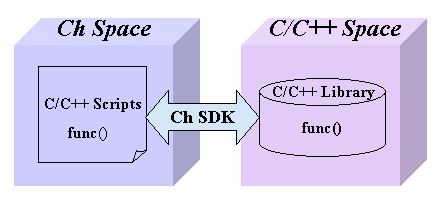|
Ch SDK allows C/C++ scripts (Ch scripts)
to interface C/C++ binary libraries.
It allows Ch scripts to access global variables or call functions in
compiled C/C++ libraries such as static libraries, shared libraries or
Dynamically Linked Libraries (DLL). Ch scripts can
callback Ch functions from C/C++ libraries.
There is no distinction
between the interpreted and compiled code.

Using Ch SDK to build dynamically loaded libraries
to interface C/C++ scripts with C/C++ libraries.
If you want to invoke Ch scripts, functions, or
variables from
C/C++ binary applications at the runtime, please try
Embedded Ch.
Ch SDK requires neither any modification of your C/C++ source code and
libraries, nor re-compilation of your applications and libraries.
It enables you to have a powerful C interpreter to control your systems and
applications across different platforms. Your binary modules
can readily be executed interpretively and shared with other users with Ch SDK. It creates a greater benefit for code reuse.
Another advantage of using Ch SDK is that you don't need to recompile
even if the binary dynamically linked
libraries are updated. Once you created a Ch package or
toolkit for the library, you
do not need to update the Ch package or toolkit if the
interface and function prototypes are not modified, even though
you have modified the internal code of functions in the library.
You can simply overwrite the existing .DLL or .so libraries.
The Ch package or toolkit can automatically access the
modified library. It saves your time for
maintenance of Ch packages or toolkits.
You will find Ch SDK an ideal solution in the following situations:
- You want to have your large existing C/C++ library accessed from
Ch scripts for rapid prototyping.
- You want to make Ch scripts run faster, and make
the frequently called underlying C/C++ functions a binary library.
- You want to protect your intellectual property and source code from
being revealed.
Ch SDK allows you to enjoy a truly powerful scripting language
environment
to interface with C/C++ libraries. Ch SDK can handle complicated C functions
such as pointer to function with different argument,
variable argument list, variable length arrays (VLAs), which are
difficult or impossible to handle by other scripting languages.
Typically, Ch SDK can access the following components in C/C++ libraries:
-
Regular C functions.
-
C functions with arguments of pointer to function, and the pointer to function
can either have argument or no argument.
-
C functions with arguments of pointer to function
and the pointer to function may have different arguments which are of different
data types.
-
C functions with arguments of class, pointer to class and pointer to pointer
of class.
-
C functions with return values of pointer to function, and the pointer to
function can either have argument or no argument.
-
C functions with variable argument lists.
-
Complex numbers.
-
Variable length arrays.
-
Struct, union, enum data types.
-
Class in C++.
-
Global variables.
Ch SDK is easy to use and yet powerful. It provides
a utility to generate wrappers for Ch to interface your C/C++ libraries
automatically. You may not need to write code to have your most job
done. To handle complicated cases such as pointer to functions,
Variable Length Arrays(VLAs)
and classes in C++, Ch SDK ships with easy to use APIs, many
templates and examples for you to get started quickly to write wrapper functions.
Ch SDK also provides you with extended functionalities in interfacing with
C/C++ libraries. For example, you can take advantage of the string type and
computational array to interface with C/C++ libraries. It will make your
Ch script easy to use without losing the power of C/C++ libraries.
It is easy to cause the memory leak for passing the argument to get
the returned value, or call a function with a return value that
is allocated in your C/C++ wrapper. Ch provides a convenient memory management
utilty
for users to have a good control and track for the memory
allocation and deallocation. Ch SDK has been effectively used to interface
with industry standard
C libraries such as POSIX, C LAPACK, X/Motif, Win32, GTK+, OpenGL, ODBC,
OpenCV,
NI-DAQ, NI-Motion, etc. Its power and flexibility
have been demonstrated.
Please click the link to download
a simple example.
This demo example is also available at
CHHOME/toolkit/demos/SDK/chapters/runc2chf_dll/chf/ directory
when Ch is installed.
An example of using
Ch SDK is
Ch K8055 Package.
It contains the source code for building
Ch interface to the Velleman USB interface board K8055.
In this example, a simplified header file k8055d_c.h is used to generate Ch
function files *.chf and dynamical loaded library libk8055d_c.dl.
Another example of using
Ch SDK is
Ch PNG Package. It contains the source code for building
cross platform Ch interface to the PNG library.
In this example,
the Ch function files and
dynamical loaded library
are generated from the original header file png.h directly.
|